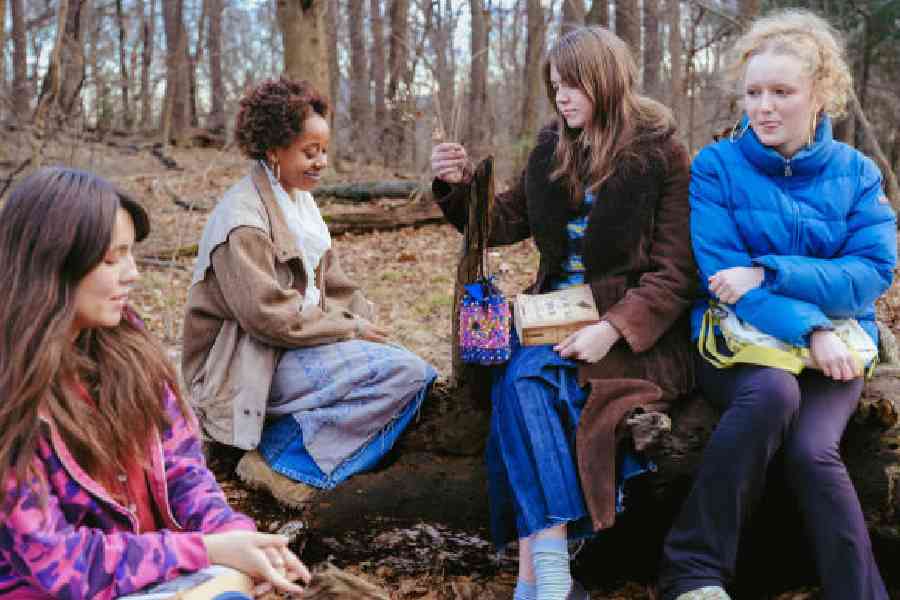The Great Detox


On a brisk recent Sunday, a band of teenagers met on the steps of Central Library in Brooklyn, New York, US, to start the weekly meeting of the Luddite Club, a high school group that promotes a lifestyle of self-liberation from social media and technology. As the dozen teens headed into Prospect Park, they hid away their iPhones — or, in the case of the most devout members, their flip phones, which some had decorated with stickers and nail polish.
They marched up a hill toward their usual spot, a dirt mound far from the park’s crowds. Among them was Odille Zexter-Kaiser, a senior at Edward R. Murrow High School, who trudged through leaves in Doc Martens and mismatched wool socks.
“It’s a little frowned on if someone doesn’t show up,” Odille said. “We’re here every Sunday, rain or shine, even snow. We don’t keep in touch with each other, so you have to show up.”
After the club members gathered logs to form a circle, they sat and withdrew into a bubble of serenity.
Some drew in sketchbooks. Others painted with a watercolour kit. One of them closed her eyes to listen to the wind. Many read intently — the books in their satchels included Fyodor Dostoevsky’s Crime and Punishment, Art Spiegelman’s Maus II and The Consolation of Philosophy by Boethius.
“Lots of us have read this book called Into the Wild,” said Lola Shub, a senior at Essex Street Academy, referring to Jon Krakauer’s 1996 nonfiction book about Chris McCandless, a nomad who died while trying to live off the land in the Alaskan wilderness. “We’ve all got this theory that we’re not just meant to be confined to buildings and work. And that guy was experiencing life. Real life. Social media and phones are not real life.
“When I got my flip phone, things instantly changed,” Lola continued. “I started using my brain. It made me observe myself as a person. I’ve been trying
to write a book, too. It’s like 12 pages now.”
The club members briefly discussed how the spreading of their Luddite gospel was going. Founded last year by another Murrow High School student, Logan Lane, the club is named after Ned Ludd, the folkloric 18th-century English textile worker who supposedly smashed up a mechanised loom, inspiring others to take up his name and riot against industrialisation.
“I just held the first successful Luddite meeting at Beacon,” said Biruk Watling, a senior at Beacon High School in Manhattan, US. “I hear there’s talk of it spreading at Brooklyn Tech,” someone else said. A few members took a moment to extol the benefits of going Luddite.
Jameson Butler, a student in a Black Flag T-shirt who was carving a piece of wood with a pocketknife, explained: “I’ve weeded out who I want to be friends with. Now it takes work for me to maintain friendships. Some reached out when I got off the iPhone and said, ‘I don’t like texting with you anymore because your texts are green.’ That told me a lot.”
Vee De La Cruz, who had a copy of The Souls of Black Folk by W.E.B. Du Bois, said: “You post something on social media, you don’t get enough likes, then you don’t feel good about yourself. That shouldn’t have to happen to anyone. “Being in this club reminds me we’re all living on a floating rock and that it’s all going to be OK.”
“We have trouble recruiting members,” said Logan Lane, the 17-year-old founder of the Luddite Club, “but we don’t really mind it. All of us have bonded over this unique cause. To be in the Luddite Club, there’s a level of being a misfit to it.” She added: “But I wasn’t always a Luddite, of course.”
It all began during the lockdown, she said, when her social media use took a troubling turn.
“I became completely consumed,” she said. “I couldn’t not post a good picture if I had one. I had this online personality of ‘I don’t care’, but I actually did. I was definitely still watching everything.”
Eventually, too burned out to scroll past yet one more picture-perfect Instagram selfie, she deleted the app.
“But that wasn’t enough,” she said. “So I put my phone in a box.”
For the first time, she experienced life in the city as a teenager without an iPhone. She borrowed novels from the library and read them alone in the park. She started admiring graffiti when she rode the subway, then fell in with some teens who taught her how to spray-paint in a freight train yard in Queens. And she began waking up without an alarm clock at 7am, no longer falling asleep to the glow of her phone at midnight. Once, as she later wrote in a text titled the “Luddite Manifesto”, she fantasised about tossing her iPhone into the Gowanus Canal.
While Logan’s parents appreciated her metamorphosis, particularly that she was regularly coming home for dinner to recount her wanderings, they grew distressed that they couldn’t check in on their daughter on a Friday night. And after she conveniently lost the smartphone they had asked her to take to Paris for a summer abroad programme, they were distraught. Eventually they insisted that she at least start carrying a flip phone.
“I still long to have no phone at all,” she said. “My parents are so addicted. My mom got on Twitter, and I’ve seen it tear her apart. But I guess I also like it, because I get to feel a little superior to them.”
NYTNS